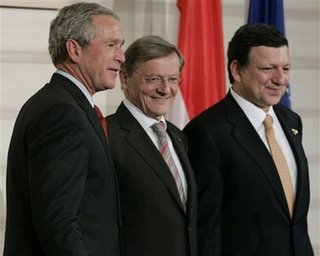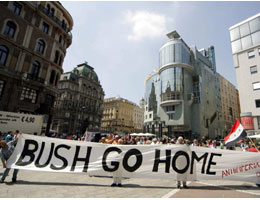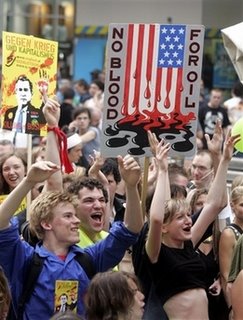Given international media obsession with the World Cup and American media preoccupation with Ann Coulter and Angelina Jolie, chances are that many of you heard little – and read even less – about President George W. Bush’s pivotal performance at a European summit last week. Yet he traveled to Austria and assembled a bona fide coalition of the willing amongst European leaders to support his “cowboy diplomacy” on the two most hot-button issues in world affairs that would have seemed impossible just months ago:
Regarding North Korea, they agreed with Bush that President Kim Jong-il should abandon any thought of launching his long-range missile test. And, regarding Iran, they agreed that President Mahmoud Ahmadinejad should respond forthwith to the Western plan calling for Iran to suspend its uranium enrichment program and forfeit all ambitions of developing nuclear weapons.
Indeed, even regarding Iraq, where Bush’s “unilateral action” threatened to cause relations between his administration and European leaders to become irretrievably broken down, they agreed that its time to “let bygones be bygones” and support U.S.-led efforts to defeat the insurgency and help the new Iraqi government “stand up” its armed forces so that coalition forces can “stand down.”
 President Bush with reconciled friends: Austrian Chancellor Wolfgang Schuessel, center, and European Commission President Jose Manuel Barroso at the all for one and one for all news conference at Hofburg Palace in Vienna, Austria, last Wednesday
President Bush with reconciled friends: Austrian Chancellor Wolfgang Schuessel, center, and European Commission President Jose Manuel Barroso at the all for one and one for all news conference at Hofburg Palace in Vienna, Austria, last Wednesday
Notwithstanding forging transatlantic consensus on a number of other issues – including on support for the beleaguered democracy in Afghanistan, “ending the Guantanamo” prison camp and advancing world (fair) trade negotiations (Doha round) – the highlight of Bush’s trip was easily the impassioned endorsement of America’s leadership in world affairs by Bush’s host – Austrian Chancellor Wolfgang Schuessel. In fact, Schuessel must have shocked and dismayed student protesters – being (mis)led by the irrepressible pied piper of anti-Bush (and anti-American) protesters, Cindy Sheehan – who were rallying outside the summit with posters reading, inter alia, “World No.1 Terrorist” and “Bush Go Home”.
However, I have lobbied zealously for credible international statesmen to voice disagreement with American foreign policies (whether on Iraq, trade or the environment) without ad hominem and unsustainable attacks on Bush and America. Therefore, I found Schuessel’s endorsement refreshing, even if long over due.
Though, more importantly, I hope his words are instructive to people (especially Europeans) whose visceral hatred of George W. Bush has so distorted their perspective on world affairs that they really believe he’s a greater terrorist than Osama bin Laden or President Ahmadinejad (who seems determined to emulate Hitler with his declared intent to “wipe Israel off the map”), and that “the United States is the biggest threat to global stability”, despite clear and present dangers posed by North Korea, Iran and Syria.
Here’s what Schuessel said:
Europe would not enjoy peace and prosperity if not for U.S. help after World War II, And I think we should be fair from the other side of the Atlantic. We should understand what Sept. 11 meant to the American people.
Let me add — let me add something. I think Austria is really a good example to show that America has something to do with freedom, democracy, prosperity, development. Don’t forget I was born in ’45. At that time, Vienna and half of Austria laid in
ruins. And without the participation of America, what fate would have Europe? Where would be Europe today? Not the peaceful, prosperous Europe like we love it and where we live.Nothing — I will never forget that America fed us with food, with economic support. The Marshall Plan was an immense aid and incentive to develop industry, agriculture, tourism. And by the way, I said it to the President, the Marshall Fund is still working in Austria. It’s now transformed into a kind — in a fund for research and development — still working.
The American people, at that time, the American government invested billions of dollars in Europe to develop the former enemy. And now we are a partner. So I think it’s grotesque to say that America is a threat to the peace in the world compared with North Korea, Iran, other countries.
NOTE: For the record, I disagreed with Bush’s decision to invade Iraq in 2003 because I thought then that it would amount to nothing more than a march of folly. (And, I expressed my concerns here, here and elsewhere.) In fact, I disagree with his administration’s policy on a myriad of issues. But I do not think that any of Bush’s policy decisions warranted the hate Bush and/or anti-American hysteria that has become so pervasive.
After all, I also disagreed with French President Jacques Chirac’s decision to destroy the entire air force of the Ivory Coast in retaliation for its soldiers killing a few French peacekeepers who were caught in the crosshairs of their fight with rebel forces. In fact, I disagree with many of Chirac’s foreign policies – especially his predilection for extraterritorial (neo-colonial) control over West Africa. But none of these disagreements has incited in me a visceral hatred of Chirac or any anti-French sentiment. (I love France, and some of my best friends are French….)
ENDNOTE: Ultimately, I hope we can all agree that Bush is not worthy of the hatred that has become a national pathology in some countries. But here’s a challenge to those of you who also hate or resent America’s power and influence in the world today: Name another country you’d rather see possess this power and influence. (e.g. China? France? Venezuela?).
Bush Austrian summit, Austrian
Chancellor Schuessel


Leave a Reply
You must be logged in to post a comment.